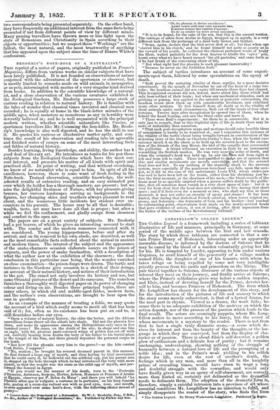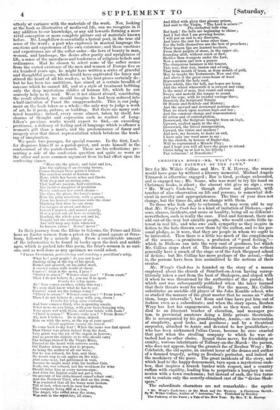LONGFELLOW'S GOLDEN LEGEND. * THE Golden Legend is a framework including
a series of tableaux illustrative of life and manners, principally in Germany, at some period of the middle ages between the first and last crusade. The story by which these tableaux are connected is that a cer- tain Prince Henry. of Hoheneck, labouring under an apparently incurable disease, is informed by the doctors of Salerno that he may be cured by the blood of a maiden voluntarily giving her life for his. He is tempted by Lucifer, appearing to him under various disguises, to avail himself of the generosity of a village maiden named Elsie, the daughter of one of his tenants, with whom he takes refuge on being expelled bysome not very intelligible priestly process from his castle and princedom on the Rhine. The pair travel together to Salerno, discourse of the various objects of interest they meet on their journey, and finally arrive at Salerno; where the Prince's selfishness gives way before a sudden impulse, and Elsie, instead of devoting herself for the Prince, devotes her- self to him, and becomes Princess of Hoheneck. The form which Mr. Longfellow has chosen for the development of this story, and for the introduction of the pictures of life and scenery to which the story seems merely subservient, is that of a lyrical drama, for the most part in rhyme. Viewed as a drama, the work fails ; be- cause there is no adequate exhibition of the motives on which the action depends, nor of the process of the passion which leads to the final result. The actors are seemingly puppets, whom Mr. Long- fellow makes to move according to his fancy, but the secret of whose movements is a mystery to the reader. There is not from first to last a single truly dramatic scene,—a scene which de- rives its interest not from the beauty of the thoughts or the lan- guage in which they are conveyed, but from the display of cha- racter or of 13assion. There is about Elsie's self-devotion a golden glow of enthusiasm and a delicate hue of purity ; but it remains unchanging, undeveloping, showing nothing of the struggle of humanity between a natural love of life and the prompting of a noble idea ; and in the Prince's weak yielding to his selfish desire for life, even at the cost of another's death, the feelings which in any man, and more than all in the knightly prince of crusading times, would have risen to wage a long and doubtful struggle with the cowardice, and would only have finally given way in an agony of self-abasement, are scarcel more than hinted at, certainly not delineated as the dr uit needs to delineate them. The adoption of the dramatic arin is, therefore, simply a suicidal intrusion into a province of nit_ ,whose essential conditions Mr. Longfellow has no intention to fdfiT, and simply disappoints the reader of the story, who finds tlieCform • The Golden Legend. By Henry Wadsworth Longfellow. Published:44ope. utterly at variance with the materials of the work. Nor, looking at the book as illustrative of mediaeval life, can we recognize m it any addition to our knowledge, or any aid towards forming a more vivid conception or more complete picture out of materials known before. Mr. Longfellow is essentially a lyrical poet, in the tree old sense of the word ; a poet who expresses in musical language the emotions and experiences of his own existence ; and those emotions and experiences are of the softer order—the love of beauty m man, woman, and landscape, the desire after purity and uprightness of life, a sense of the sacredness and tenderness of religious beliefs and ordinances. Had he chosen to select some of the softer scenes from the varied existence of the men and women of Europe five or six hundred years ago, he might have written a series of graceful and thoughtful poems, which would have captivated the fancy and stirred the heart of all his readers, as his best pieces certainly do : but he has been too ambitions, has aimed at a certain breadth of canvass which he cannot fill, and at a style of treatment befitting only the deep mysterious riddles of human life, which he can scarcely help us to read. Were it not almost absurd, considering the result attained, we should imagine he had been seduced into a half-imitation of Faust the unapproachable. This is our judg- ment on the book taken as a whole—the only way to judge a work of art, be it poem, picture, or building. But there are many scat- tered beauties ; indeed, every scene almost, taken by itself, has charms of thought and expression such as readers of Lng- fellow's previous works would expect to find,—an exceeding prettiness, a delicacy of feeling and of language which is oftener a woman's gift than a man's, and the predominance of fancy and imagery over that direct representation which betokens the work- ing of imagination.
We quote two passages, for special reasons. In the first, Luci- fer disguises himself as a parish-priest, and seats himself in the confessional of the parish-church. These are his reflections; pre- senting a side of the confession question not quite so worn as the other and more common argument from its bad effect upon the confessing sinner.
"Here sits the priest; and faint and low, Like the sighing of an evening breeze, Conies through these painted lattices The ceaseless sound of human wo.
Here, while her bosom aches and throbs With deep and agonizing sobs, That half are passion, half contrition, The luckless daughter of perdition
Slowly confesses her secret shame—
The tune, the place, the lover's name !
Here the grim murderer, with a groan, From his bruised conscience rolls the stone Thinking that thus he can atone For ravages of sword and flame !
Indeed I marvel, and marvel greatly,
How a priest can sit here so sedately,
Reading, the whole year out and in,
Naught but the catalogue of sin,
And still keep any faith whatever
In human virtues! Never! never!"
In their journey from the Rhine to Salerno, the Prince and Elsie hear an Easter sermon from a priest on the grand square at Stras- burg, followed by a miracle play. From a considerable amount of the information to be found in books upon the dark and middle ages, which is packed into this poem, the friar's sermon is as curi- ous, and as well done as any specimen we could select.
"FRIAR CUTHBERT, gesticulating and cracking a postillion's whip.
What ho ! good people! do you not hear ? Dashing along at the to of his speed, Booted and spurred, on his jaded steed, A courier comes with words of cheer.
Courier ! what is the news, I pray ? "Christ is arisen!" Whence come you? "From court." Then I do not believe it ; you say it in sport. Cracks his whip again. Ab ! here comes another, riding this way ; We soon shall know what he has to say. Courier! what are the tidings today ? "Christ is arisen !" Whence come you ? " From town." Then I do not believe it ; away with you, clown ! Cracks his whip more violently. And here comes a third, who is spurring amain. What news do you bring, with your loose-hanging rein, Your spurs wet with blood, and your bridle with foam ? "Christ is arisen !" Whence come you ? "From Rome." Ah, now I believe. He is risen, indeed. Ride on with the news, at the top of your speed ! Great applause among the crowd. To come back to my text ! When the news was first spread That Christ was arisen indeed from the dead, Very great was the joy of the angels in heaven; And as great the dispute as to who should carry The tidings thereof to the Virgin Mary, Pierced to the heart with sorrows seven. Old Father Adam was first to propose,
As being the author of all our woes;
But lie was refused, for fear, said they, He would stop to eat apples on the way.
Abel came next, but petitioned in vain,
Because he might meet with his brother Cain. Noah, too, was refused, lest his weakness for wine
Should delay him at every. tavern-sign ;
And John the Baptist could not get a vote, On account of his oldfa,hioned camel's-hair coat ; And the Penitent Thief, who died on the Was reminded that all his bones were broken. Till at last, when each in turn had spoken, The company beingstill at a loss, The Angel, who rolled away the stone,
Wu sent to the sepulchre, all alone,
And filled with glory that gloomy prison, And said to the Virgin, "The Lord is arisen !" The cathedral bells ring. But hark! the bells are beginning to chime ;
And I feel that I am growing hoarse.
I will put an end to my discourse, And leave the rest for some other time. For the bells themselves are the best of preachers ; Their brazen lips are learned teachers, From their pulpits of stone, in the upper air, Sounding aloft, without crack or flaw, Shriller than trumpets under the Law, Now a sermon and now a prayer. The clangorous hammer is the tongue, This way, that way, beaten and swung, That from month of brass, as from mouth of gold, May be taught the Testaments, New and Old. And above it the great cross-beam of wood Representeth the holy rood, Upon which, like the bell, our hopes are hung. i And the wheel wherewith t is swayed and rung Is the mind of man, that round and round Sways, and maketh the tongue to sound. And the rope, with its twisted cordage three, Denoteth the Scriptural Trinity Of Morals and Symbols and History; And the upward and downward motions show
That we touch upon matters high and low ; And the constant change and transmutation
Of action and of contemplation, Downward, the Scripture brought from on high, Upward, exalted again to the sky; Downward, the literal interpretation, Upward, the vision and mystery ! And now, my hearers, to make an end, I have only one word more to say : In the church, in honour of Easter-day, Will be represented a Miracle Play ; And I hope you will all have the grace to attend. Christ bnng us at last to his felicity ! Pax vobiscum! et Benedicite!"



































 Previous page
Previous page